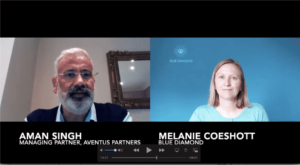What changes in working practices do you anticipate in the next 12 months & beyond?
We’ve all experienced unprecedented changes since March 2020, but there’s probably more to come in terms of our working practices.

None of us have a crystal ball, but many of us have insights and ideas. I wanted to pick the brains of my inspirational leaders on this one.

Adam Mussert – It’s interesting, isn’t it? I think everyone’s spending quite a bit of time reflecting on and trying to foresee where we go as we emerge from this and what the world will look like afterwards.
This is a painful situation for many people, but for others, this is creating opportunities, and they’re seeing situations that they’d quite like to continue. So, I think. everyone is being asked to be more flexible now as a result of this and I just don’t know how it’s all going to play out.
I just imagine that the whole concept of working from home – how many of us have needed to work and will need to work for some time – will prompt some organizations to question whether they need to pay a lot for real estate in prestigious locations. I normally work in Canary Wharf, or I did. I wonder how that will all change in the years to come.
So, the keyword I keep coming back to is flexibility in terms of people.
Organizations may be thinking that now they’ve got the infrastructure in place that enables them to work flexibly, does that open the door to a different way of working, where remote working becomes less of an exception and more the norm? Whereas previously people maybe worked 10 or 20% of their time flexibly from home, that could shift substantially.

Aman Singh – The last few months have been unprecedented. No one could have ever foreseen the challenges that have happened.
The biggest change for a lot of us is working from home, and I would say an extension of that would be flexible working and virtual working, with both teams working together with each other. I think those are the signs of time and this is going to stay.
Had you just spoken to me four months back and said, “Would you be willing to let your colleagues work from home?” I would have probably said “no”. Not that I don’t trust them. We’ve got a great team here. The majority of the people I’ve worked with for a number of years, so there is a huge amount of trust between us. I’m probably old school when I say that I prefer working with people alongside each other, but I think flexible working is going to be the new norm.
Luckily for us, working from home has worked out very well. The firm was set up on the basis that we could work remotely from anywhere, although that had never been tested. Even before the lockdown, we made a decision that we would all work from home for safety, and from the second week of March, we’ve all been working quite effectively and efficiently from home. It comes with its own challenges, but I think it’s been seamless for our clients. Apart from being a little lonely and a little desperate at times with the IT, everything seems to have gone very well.
Flexible working is definitely something that has come out of these unprecedented times.
We have a number of young mothers, with young families, so we have to accommodate everyone. That means that people could work at whatever time suited them as long as the client deliverables weren’t affected. If they were going to be affected, then at least we communicate with them early enough and manage expectations.
I think those two are things that will continue to stay with us as we forge ahead in these new times. A number of very large companies are already doing this. I know Google and some other large organizations have said that everyone is going to work from home. There will be flexible working and this is going to continue until the end of this year and may continue into the future as well. I think that’s here to stay.
A lot of these things will come with their own challenges. People are talking about productivity, which hasn’t affected us, but I think that’s going to be a challenge – monitoring team members and deliverables. There are IT tools that you can use and we are trying to look at those ourselves. Those are going to be some of the challenges.
There’s also something about keeping all the team members involved. I think as we work remotely, there may be people who feel a bit more vulnerable. Not everyone is an extrovert. There are some introverts who may come on calls, may not express themselves, and may not be able to communicate enough, and their well-being would be very, very important. We may need to have more empathy and compassion for certain members as they feel a little isolated.
Finally, there may be a challenge when you have new people joining the team. We’re now interviewing our trainees for this year, and I’m not sure how we’re going to get them, not only in their early learning but also get them to understand our culture, our business ethics, and our way of working. This is going to be a big challenge and I think this is there to stay as well. Getting that comfort from a Zoom interview may not happen. It doesn’t give me that feeling, so let’s see how things go.

Debbie Fogel – Well, I’m sure there are changes yet to reveal themselves. I believe we’re still in the middle of a lot of change and the chapters of the book are still to be read. But I think there are some things that have become very clear already.
One obvious one is the remote work situation. I think some people feared remote work, even as a leader managing an organization. Or I think people may have tended to behave ‘out of sight out of mind’, because it was a few people in the office and we just, by habit, tended to go to the people that were in the office because in the old days, if you weren’t in the office you were on vacation or you were out of office for whatever reason and so we got used to calling on other people who were in the office. I think now that everyone, or nearly everyone, has had to work remotely, at the same time, some of those myths about remote working will have been squashed and I think we’ll find that it’s more common, more accepted, and more productive for people to work remotely. So, that’s for sure, a clear change.
And then there are many behaviors around that that become different, how we lead, how we communicate, how we interact, finding time for casual conversation, maybe not focused on the task at hand, but just building the team and building trust and getting to know the human behind the work.
I think that remote working to the scale that we’ve done will definitely change the future.
I think too it’s going to accelerate we way we innovate and whether it’s new products or new solutions in our business or infrastructure, this timeframe has really accelerated. How do we deal with the issue that we have? As an example in the Institute for Supply Management, when we look at the impacts on the supply chain, I think people will be thinking not only about low-cost solutions for their supply chain, but also more resilience and maybe back to the days of having physical inventory and not just building to order or everything sourced from one supplier all over the world because there’s a lot of complexity in supply chain and in some cases, not even the visibility to the whole supply chain.
I think that is certainly going to change the way we think about how we run our business and how we get organized.

Dr. Celine Vousden – From my perspective, it’s been incredibly heartening to see that there is this attention to mental health and well-being and how it has impacted us.
As a GP and occupational health doctor, I’ve always found it really saddening to see the stigmatized sensation that is really evident in society with regard to our emotional well-being and mental ill health or periods of mental health. To the extent that many patients I see are really experiencing quite significant symptoms, but wouldn’t ever dream of bringing it up in the workplace. It’s not even a possibility for them to do so because that would impact how they work or how they’re perceived at work.
To me, there’s been a shift in people recognizing this, with people who didn’t necessarily have problems before with anxiety and depression experiencing it now. Interestingly, I’ve seen as well in my clinical practice, those that who have had problems are actually doing quite well in the current situation. Things have really turned on their head in that sense. I hope that’s going to continue forward.
I think that there’s a greater awareness for organizations that the need and the importance of really recognizing, measuring, looking at, and understanding the emotional well-being of their people, and seeing how that really can connect with how they show up at work, and the importance I suppose of connecting together and understanding each other’s emotional well-being by perhaps asking more questions than they would have before.
That is one thing, but perhaps it is an acceptance that we are human and that we do experience times when things are frustrating, where our emotional well-being is just not in the place that we’d like it to be. Those ups and downs or significant mental health problems such as depression or anxiety persist for a while. I hope there’s going to be a greater acceptance of that and a greater understanding because actually when things are pushed away that they become more problematic, but when things are open and there’s a more open environment, then it’s easier to effect change and ride those storms a bit more. That’s one aspect.
Other things that I hope going forward will be that flexibility that we’ve rapidly had to adjust to in terms of how we work. Obviously, a lot of organizations to some extent were set up to offer working from home, but now suddenly, there’s a huge shift to everyone working from home. That’s been really phenomenal to watch, certainly in the occupational health field that I’m in, and actually in general practice as well. An organization like the NHS can often be quite slow, the cogs of change, the wheels of change, but we’ve seen how quickly things can shift.
Certainly, in the GP world, I can’t see that we’d ever go back fully to how things were before as there’s a much more efficient way of operating. I do hope that going forward as well and no doubt for the next couple of years, we’re going to have that much greater flexibility about working from home. There’s so much to say that can really support the well-being of an individual, and to me that has a positive effect on their performance and many parameters.
That flexibility around how we work and when we work – because many of us have had to adjust to having children at home. Then there’s going to be a greater understanding that people can still deliver the work in the way that works for them, because why do we all have to fit into this very 9-6 box or whatever that might be? We’re all individuals, we all have our own individual differences in terms of how we work best, etc. Hopefully, more organizations will be more open to exploring that and understanding and finding mutual ways of working with that.
Some other ways I think things are going to change? I certainly think communication has become so vital. Particularly not having this physical ability to connect, to see people, and with rapid changes of so many policies, government changes, etc. The need for very clear synced communication is absolutely essential. Particularly when you’re not able to deliver that face-to-face if it has to be electronic. Communication is being challenged. How we all deal with change, can potentially be very stressful as it has been for many, but the more we learn to tolerate uncertainty and the more we learn to navigate change, the easier it will become and the more adept we become at managing that.
Ultimately, we know through evolution the world has slowly, through technology, been picking up the rate of change anyhow. We’re starting to adjust to that anyhow, but in adjusting to managing uncertainty and change, then also in doing that, we’ll employ skills that will allow us to build resilience and manage stress, which is something that’s going to take us forward no matter what for the future.

Garry Crosby – Yes, it’s difficult. I’m getting a bit tired, if I may be so bold, with this idea of the ‘new normal’ that I’ve heard a lot of people talking about, but I’m encouraging people, whether they’re leaders or managers or employees, to think about what I’ve called OBS, which is Outcome Based Freedoms. Actually, now’s a great time to start thinking about how to shape your workforce in a way that is focused on the outcomes.
Many business owners have always done this in a way, but they should start asking questions like “Why do staff need to commute for a couple of hours every day?” “Why do they need to sit at this desk?” You know face to face for eight hours a day. “Why do they need to face time in order to progress?” because if actually employees are asking for Outcome Based Freedoms, they’d be delivering the outcome of the company, wherever they are. So, that’s an important shift I can see coming.

Jenny Garrett – It’s highly likely we’ll have a second wave. I’m not sure if we’re going to all move back into business as it was before. I’d be really happy if we didn’t because I think there was lots of change that needed to happen. I think people will travel less and use technology more. Initially, everyone was so excited about working online, and we were really energetic about it. I think we’ve actually become a bit fatigued with online calls one after another. I had six yesterday, which was a lot. I think we’re going to be pulling back a little bit. Everything doesn’t have to be an online call. Maybe we going to use the phone a bit more, WhatsApp, to have a bit more informal interaction.
The thing about Zoom or whatever you use is that it’s, “Let’s schedule it. Let’s have a call. Let’s book it in for 15 minutes.” What we’re not getting is those water-cooler chats, those five minutes. “Oh, I just bumped into you on my way somewhere else.” I think finding a way to have that informality is something that I think we’re going to seek and hopefully find. I think we’ll still work from home a lot more if that’s possible for us. But, I think we’ll have more informal interactions and find ways to do that using technology.
I also think there’s going to be an increase in regionalization. I’m based in Hertfordshire. I’ve spent a lot more time in Hertfordshire than I probably have for a number of years. You get to know your community more, and you care more about your community as a result.
I think there’s going to be an increase in regionalization but also advances in technology.
I think there are going to be leaps and bounds in terms of using artificial intelligence in our work. That’s how I see it. Less traveling, more local, more online, but also an appreciation of when we do have face-to-face interactions, a really an appreciation of that, that perhaps we took for granted previously.
Johan Gabriels – I think it’s a lifetime experience with most of the world now working from home. And, it kind of works, at least on a limited basis. I think we will definitely go to a situation where a couple of days per week or a week per month, people can work from home. I think that there’s going to be a change,
Maybe it’s even an opportunity for fewer traffic jams. I read somewhere that if twenty percent of the people work from home you actually solve fifty percent of the traffic jams because it’s obviously not a linear equation. So that’s definitely something.
Also, the way that we might talk with clients. I guess sometimes it’s important that we see clients face to face and that could remain. But occasionally. Again, in order to avoid traffic jams and to save time, we can use more video conferences and I think the technology is definitely there to use that.
We might also see an improvement in people’s work/life balance better. I’ve seen that some of my people are very happy to work from home. It is probably the more introverted that are OK with this.
The extroverts who need the noise and the people around them to motivate them are probably the more willing to go back to work.
But having now that choice might increase the overall productivity and motivation of our staff.
The people will remember 2020 working from home and will refer to it and the positive things about it. Kate Morris – I definitely see things changing in terms of looking work-life balance structure, it has to be a blend. There is no one or the other now, it is just your day and it encompasses those things. It takes away the anxiety of how to fit it all in. If you’ve got less time to have to travel, you’ve got more time then to be able to work through how things work best for you.
Kate Morris – I definitely see things changing in terms of looking work-life balance structure, it has to be a blend. There is no one or the other now, it is just your day and it encompasses those things. It takes away the anxiety of how to fit it all in. If you’ve got less time to have to travel, you’ve got more time then to be able to work through how things work best for you.
I think it changes the focus: rather than being ‘front and center’ in the office, it changes to being output-based. For me as a leader, it was never about “you have to be in the office nine to five”. I wanted to make sure that you’re getting through what you need to be done, really making sure that people are focused on that output. If it takes them a little bit less because they are a fast-paced kind of person, awesome.
Is there an opportunity to give them some more work as opposed to, “It’s taking somebody a bit longer,” that’s okay? Because of the structure of what they have, there could be other things in their life they have to worry about. Being appreciative of the different places that people work in and making sure that it’s all about the output, not about the face time.

Keith Douglas – A good question. I’ll be the first to say that in the ten weeks, or so I’ve been working from home, I’ve learned quite a bit about my team and quite a bit about myself. I’m sure that wouldn’t be a surprise to you or any of your clients because I think we’ve all had that experience in some way, shape, or form, be it through a work lens or through a personal lens. And we’re all conscious of finding that balance between work and our personal lives.
For the first time in a long time, I think it’s thirteen weeks now, and counting, I haven’t been on a plane. That’s been a nice experience in one sense, but what have I got out of it?
I’ve got a few things:
One is the importance of teams in breaking down silos, and this environment where we’ve had to work from home has really forced us, as a team to operate, not so much in different ways, but in a consistent way through phone. You don’t have body language when you’re on a call, whether it’s with a client, with a partner, or with a member of staff. But how we’re now also collaborating as a team using tools like Microsoft Teams, using Skype, and using other platforms and other techniques to help each other drive our business has demonstrated a couple of things to me.
One is to never underestimate the power of the individual. When given direction and when trusted through empowerment, people will drive.
Secondly, you don’t have to manage in an overbearing way. This is around trust and trusting your team to do what it is and what they’re expected to do in the course of this work-from-home environment. That’s critically important because you’re not physically in front of them. You’re not physically checking in and checking in less frequently than you would do in an office. Giving that space, showing that trust. Even though the temptation is as a leader to lean in and help them, given the circumstances and the environment and maybe challenges they are having at home. Trust them. And if you trust them in an inappropriate way, they’ll trust you and then flag you when they need input and they need help.
These are the two big learning points for me
A third one I want to mention is less of a learning point, but certainly, I now realize that being in the office is not the be-all and end-all. You can successfully drive a business this way. However, human interaction, and human contact – over and above video like we’re using today – is important and certainly, shouldn’t be ignored, notwithstanding how my team has successfully navigated the last twelve weeks!

Lesley Spencer – I can very much see more to more home working. I think a number of companies have always been very good at this and have had a much more agile approach than others. I think for the ones that have been more reluctant to do this previously, this has shown that more people can work from home than originally envisaged. I think it’s taken away some of the reluctance that was there previously because of its accelerated changes that maybe some businesses had planned over a two to three-year time frame. That change has been accelerated within a very short period of time.
I think some individuals absolutely love the experience. I think for others that this has been quite difficult because it’s been working from home, but in a slightly strange scenario where you have children with you and you’ve maybe not been able to work in the way that you might want to do.
I think for some people there’s going to continue to be a kind of evolution in working from home in hopefully a more stable environment. But I think it would then very much change the role of the office. I don’t necessarily think that the office will be a place to work anymore, I think it will be a place to collaborate and a place to socialize, with people only going in on certain days of the week if they absolutely need to, with way more people working from home on a more regular basis.
I think from a structural point of view it changes the way businesses will operate. In terms of the skills that you need, I think you do have to refine your people management skills and also you know leadership skills to be able to work remotely and still have that cohesive team mentality that some people may feel is easier to have if you have people working face to face.
I think the other thing that it does is to engender a greater sense of trust, to work away from the office, when you can’t see them and you can’t see what they’re doing. But I think that actually should improve your relationship all around. I can see quite a big shift actually occurring and I don’t think that will change back. I think it’s here to stay.

Thanks for reading. Check out the other interviews in the Post Lockdown Leadership Review series.
Check out other Blue Diamond articles to help you take control of your work and life.
